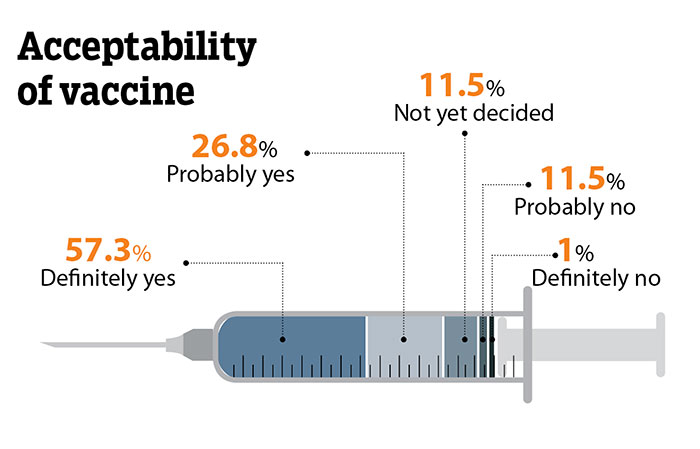Younten Tshedup
If numbers are any indication, Bhutanese are ‘highly’ receptive to the Covid-19 vaccination.
To understand and assess public perception towards the Covid-19 vaccine, an online survey was conducted in January this year.
According to the survey, almost 85 percent of the respondents said they would take the vaccine.
A total of 7,476 (2,884 females and 4,592 males) took part in the weeklong online survey conducted by the health ministry’s technical advisory group (TAG) members — clinical microbiologist Dr Tshokey and senior programme officer Ugyen Tshering.

The majority of respondents (4,311) said that they would ‘definitely’ take the vaccine if available, including 2,004 people who said they would ‘probably’ take it if made available. 71 (1 percent) people said that they would ‘definitely not’ take the vaccine, while 231 (3 percent) reported they may probably not take the vaccine. 859 people had not decided to take the vaccine then.
Ugyen Tshering said that the acceptance level was higher among the educated groups of respondents. The majority of respondents were in the age group 18-40 years (82 percent).
He said that the overall positive response of 84.5 percent was comparatively higher than most of the countries in the region where similar studies have been carried out. “Although the willingness to accept the vaccine is sufficient to meet the requirements of herd immunity, there’s a need to conduct vaccine literacy and develop interventions to build trust and confidence to support the uptake of a Covid-19 vaccine.”
While 78 percent of the respondents wanted to wait for more data on the vaccine, the survey also showed that 43 percent wanted to get the vaccines manufactured in developed countries, such as the US and UK.
Fifty-seven percent of the respondents said that they were ‘not really worried’ about the side effects of the vaccine. 74 percent said that the vaccine would protect the ones who receive the jab.
Dr Tshokey said that the survey was taken at a time when news of Covid-19 vaccines was just developing. “It gave us a rough idea of the perception and acceptance level of our people on the Covid-19 vaccine.”
Now that the vaccine has arrived in the country and the mass vaccination campaign starting soon, he said that people today had more understanding and knowledge of the vaccine.
He also claimed the prime minister’s personal efforts to clarify and make people understand the benefits of the vaccine have also worked. “We’ve had enough time to observe what has happened across the world and I think the vaccines have come at the right time.”
On the issues of blood clot and suspension of the AstraZeneca vaccine in some European countries, the clinical microbiologist said that, while investigations were underway, there were several evidences that the blood clots were not linked to the vaccine.
“Such issues are common, especially when a vaccine is being introduced for the first time in any country. This is not unusual,” he said.
Dr Tshokey said that people should get vaccinated to protect themselves from the virus and as a duty to the state.
He explained that if a person gets the jab, primarily he or she is protected from the virus. “The protection also includes experiencing a mild form of the disease if infected and protecting those who aren’t eligible for vaccination.”
He said that people should get the vaccine as a duty to the state. “This is because every country must achieve coverage of about 75 percent to get herd immunity. If majority of people don’t take the vaccine, the country won’t achieve herd immunity. That will be a problem for the country as more people would still remain vulnerable to the infection.”
While the vaccine is believed to return things to normal, he said that it wouldn’t be until the second dose of the vaccine was administered to all the eligible population, which had been tentatively planned between eight to 12 weeks after the first dose.
Dr Tshokey said that, only after the delivery of the second dose of the vaccine, and a cushion period of two weeks, an individual would be considered fully vaccinated. Meaning, things would return to ‘normal’ only towards the end of June or the beginning of July this year.
In the meantime, the clinical microbiologist said that, even after the vaccination, people must continue to adhere to public health measures. “Although it’s proven that the vaccine will protect you, you could still carry the virus and infect others who haven’t received the vaccine.”

